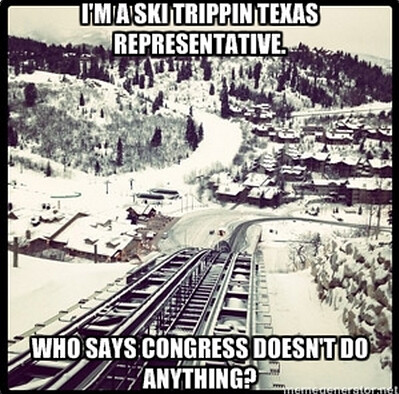
Instagram photo posted by Mortgage Bankers Association lobbyist Len Wolfson during their fundraising ski trip with Rep Jeb Hensarling (R-TX) -- Memify this!
Via Occupy Wall St.:
One might think that with the wave of scandals that have rocked the banking industry in the last several months, from HSBC money laundering to drug cartels, to the lies perpetuated in the JP Morgan London Whale trades, that politicians might have some sense of shame about continuing to deregulate on behalf of the banks. One might think that even if they are captured completely by their true bosses--Wall Street--that politically, they would have enough sense to go easy, lay low, and not carry the water for the banks so soon after this deluge of scandals.
You'd be wrong.
This Tuesday, the House Financial Services Committee will be reviewing nine bills that gut many of the reforms passed to regulate derivatives on Wall St in 2010. These bills vary in the specifics of their aims, but all effectively make profits easier for Wall Street, often at the expense of the American public.
As Mike Konzcal wrote for the Washington Post, “One bill would weaken cross-border regulations, allowing U.S. firms that run their derivatives in other countries to avoid following the new derivative rules. Another would exempt inter-affiliate swaps, or derivatives between various corporate entities, from having to follow the new Dodd-Frank derivative rules.”
But by far the most egregious of these bills is HR 992. Currently, banks can hold three kinds of derivatives in the same accounts as depositor funds--those that enjoy FDIC insurance. HR 992 would expand this to allow banks to hold ANY kind of derivative, with one exception (a structured swap, which is defined in the bill), in the insured depository.
The reason this is a problem is because derivatives are senior in bankruptcy. In the event a big bank went under, hedge funds sitting on the other side of trades with the bank would get money paid back to them first. If the hedge funds and other companies the bank traded derivatives with (what is technically called a “counterparty”) exhausted the funds set aside to insure the regular depositors (those with checking and savings accounts), the FDIC would have to 1) sell assets from the failed bank to raise money, and 2) try and fight to get back some of this money from the derivatives counterparties. If that didn’t work, the Treasury would step in and give a loan to the failed bank for 5 years--which essentially is a bailout. Banks want to hold their derivatives in the insured account because it makes it cheaper for them. HR 992 at its heart is about making the cost of doing business cheaper for Wall Street at the expense of Main Street.
These bills will most likely pass the Republican-controlled House Financial Services Committee. They will likely garner support from every Republican on the committee. Republican Randy Hultgren will certainly vote for his bill, HR 992 mentioned above. The head of the committee, Jeb Hensarling (known for a lavish ski vacation with Wall Street lobbyists). Another Republican, Scott Garrett, is also stuffed full of Wall Street cash, and will be sure to show his support for the banking lobby on Tuesday.
But there are also many Democrats who will likely vote for these bills. Jim Himes of CT (@jahimes) is a co-sponsor of one of the dangerous HR 992. David Scott of GA (@repdavidscott) is another co-sponsor, and he will also show allegiance to Wall Street on Tuesday. Carolyn Maloney of New York (@RepMaloney), will also likely vote on behalf of the banks, as she has proven a long-time ally of Wall Street.
Despite the fact that the ongoing wave of banking scandals demonstrate that the megabanks willfully violate existing laws, politicians on both sides of the aisle remain ready and willing to march ahead on their behalf, tearing down even the meager protections put in place after the financial crisis.
The bipartisan support for these bills shows that Wall Street still runs the show. And it also shows that even in the wave of revelations of money laundering by banks to drug cartels, politicians are still willing to risk populist rage in order to demonstrate where their ultimate allegiance lies. The banks remain so powerful, that Democrats and Republicans alike are willing to risk their re-elections rather than stand up to the criminals on Wall Street who give them their marching orders.















